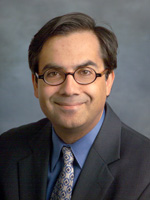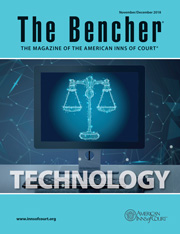Adopted Amendments to ABA Model Rules on Advertising
The Bencher—November/December 2018
By John P. Ratnaswamy, Esquire

 On August 7, 2018, the American Bar Association’s House of Delegates, by an overwhelming voice vote, adopted amendments to the ABA’s Model Rules of Professional Conduct relating to “Information About Legal Services”, commonly known as the Model Rules on advertising. The amended Model Rules vary in some ways from the then-proposed amendments described by my March/April 2018 column in The Bencher. Although the proposed amendments had a lot of momentum, some ABA entities (including bodies concerned with discipline and professionalism) raised concerns and suggestions that led to revisions over the two weeks leading up to the vote.
On August 7, 2018, the American Bar Association’s House of Delegates, by an overwhelming voice vote, adopted amendments to the ABA’s Model Rules of Professional Conduct relating to “Information About Legal Services”, commonly known as the Model Rules on advertising. The amended Model Rules vary in some ways from the then-proposed amendments described by my March/April 2018 column in The Bencher. Although the proposed amendments had a lot of momentum, some ABA entities (including bodies concerned with discipline and professionalism) raised concerns and suggestions that led to revisions over the two weeks leading up to the vote.
The amendments are the result of discussions started by the Association of Professional Responsibility Lawyers (APRL) in 2013. The ABA’s Standing Committee on Professional Ethics and Responsibility has had a lead role since 2016. The standing committee (with co-sponsors) was the formal proponent of the revisions adopted by the house.
The amendments to Model Rule 7.1 (Communications Concerning a Lawyer’s Services) are modest. The amendments do not change the body of the rule. They add several comments relating to law firm names and designations, which reflect material taken and revised from Model Rule 7.5, and make other minor changes.
The amendments to Model Rule 7.2 change the name of the rule from “Advertising” to “Communications Concerning a Lawyer’s Services: Specific Rules.” The amendments simplify the body of the rule’s references to different forms of communication; add a provision permitting “nominal gifts as an expression of appreciation”; add revised language about certification as a “specialist” that is moved and revised from Model Rule 7.4; delete certain comments that discussed advertising in general; clarify that directory listings and group advertisements that list lawyers by practice area, without more, are not impermissible “recommendations”; and add comments about communications about fields of practice, along with other limited changes.
The amendments to Model Rule 7.3 (Solicitation of Clients) are more extensive. The amendments add a definition of solicitation to the body of the rule; revise the provisions on “live person-to-person contact”, including by changing the concept of a person experienced in the type of legal services involved for business matters to a person who routinely uses for business purposes the type of legal services offered by the lawyer; simplify references to forms of communication; delete language about marking materials as “Advertising Material”; and, add a provision on communications authorized by law or ordered by a tribunal. The amendments also add comment language on what is meant by “live person-to-person contact”; delete some discussion of recording of advertisements; and, add some discussion of concerns about live contact, among other changes.
The amendments delete Model Rule 7.4 (Communication of Fields of Practice and Specialization), its substance, as revised, having been absorbed by Rule 7.3. Similarly, the amendments delete Model Rule 7.5 (Firm Names and Letterheads), its substance, as revised, having been incorporated in Rule 7.1.
The “movement” to revise the Model Rules on advertising had multiple objectives, including modernization, simplification, and encouraging more uniformity among states. The amendments modernize the rules in many respects, although there has been debate about whether they went far enough or sufficiently recognized court decisions on First Amendment issues. There also has been some debate about whether the amendments did enough to streamline the rules. That is a difficult task for a subject with a wide variety of stakeholders. Whether the amendments will lead to more commonality among states remains to be determined.
John P. Ratnaswamy, Esquire is a partner in the Chicago law firm of Rooney Rippie & Ratnaswamy LLP. He also serves as an Adjunct Professor of Legal Ethics at the Northwestern University School of Law. He is a former member of the American Bar Association’s Standing Committee on Ethics and Professional Responsibility and is the current chair of the ABA Solo, Small Firm, and General Practice Division Committee on Ethics and Professional Responsibility. This column should not be understood to represent the views of any of those entities or his or the firm’s current or former clients.